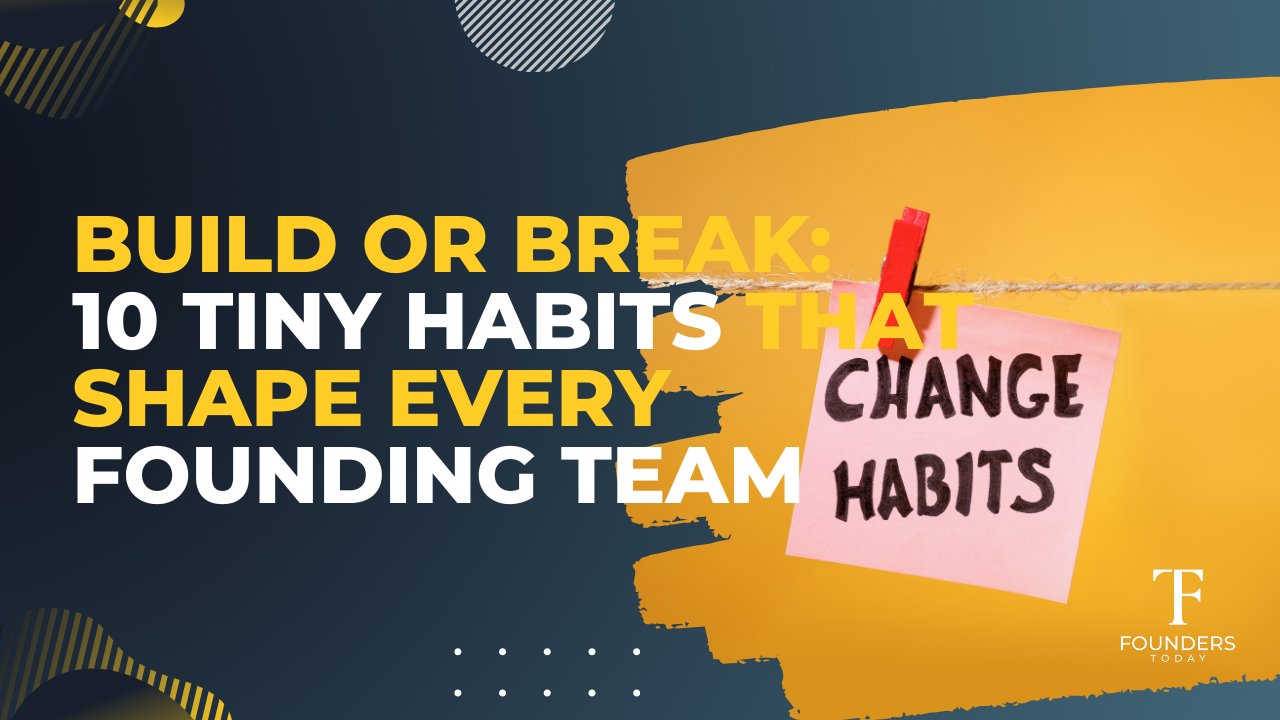
Startups don’t fail because of bad code or poor branding—they fail because the team breaks before the product ever gets a chance. When you strip away pitch decks and product-market fit, it’s the daily habits of a founding team that ultimately define whether a startup will thrive or fall apart.
Surprisingly, it’s not the big strategic decisions, but the tiny, often invisible behaviors that make all the difference over time.
Here are 10 small habits that can either build a bulletproof founding team—or slowly eat it from the inside.
1. Daily Check-Ins > Monthly Offsites
Make it a habit to start each day with a quick 10-minute check-in:
– What are you working on?
– Any blockers?
– How’s your energy?
These aren’t status meetings—they’re emotional barometers.
Over time, this daily rhythm builds trust, uncovers tensions early, and prevents misalignment from snowballing into conflict.
💡 Miss this, and silence becomes your team’s biggest risk.
2. Writing Things Down
Documentation sounds boring—until you’re six months in and no one remembers why a critical decision was made.
Tiny habit: summarize key decisions in writing (Slack, Notion, email).
This creates a shared memory, ensures clarity, and helps new team members onboard faster.
💡 Forget this, and you’ll keep repeating the same debates.
3. Disagreeing Early and Openly
Great co-founders fight—constructively.
Bad co-founders stay polite until it’s too late.
Make it normal to challenge each other early, especially when something feels off. The habit? Use phrases like:
– “Can I push back on that?”
– “What’s the assumption behind this?”
💡 Sweeping conflict under the rug today means it’ll blow up tomorrow.
4. Owning Mistakes Publicly
When a founder admits, “That was on me,” it sets the tone for the entire team.
Create a culture where mistakes are seen as learning signals, not weakness. This habit builds psychological safety and keeps egos in check.
💡 Avoid this, and finger-pointing becomes your company’s default mode.
5. Saying ‘Thank You’—Out Loud
Startups move fast. It’s easy to skip the small moments of recognition.
But a simple, genuine ‘thank you’ after a tough day or critical task goes further than any bonus.
Make it a habit to call out effort—not just outcomes.
💡 Lack of appreciation doesn’t cause burnout—lack of recognition does.
6. Clarifying Roles (Again and Again)
At the start, everyone does everything. But as you grow, unclear roles breed resentment.
Regularly revisit:
– Who owns what?
– What decisions need consensus?
– What does success look like for each role?
The habit here is re-aligning, not assuming.
💡 Unclear ownership = hidden landmines.
7. Blocking Time for Thinking
Startups are a race—but constant execution without reflection leads to chaos.
Founding teams that win long-term schedule time to think:
– Strategy days
– Solo planning hours
– Tech debt reflection sessions
It’s a small discipline with big returns.
💡 Working harder isn’t the same as thinking smarter.
8. Ending Meetings with Action
Never leave a meeting without knowing:
– What’s next?
– Who’s doing it?
– By when?
This tiny ritual eliminates ambiguity and builds momentum.
The habit: assign ownership in real-time, not in a follow-up email.
💡 Lack of clarity today = dropped balls tomorrow.
9. Defaulting to Transparency
In high-pressure environments, it’s tempting to withhold bad news or sugarcoat risks.
Founders who build resilient teams default to honesty—especially when things get hard.
Whether it’s cash runway, customer churn, or a failed experiment—sharing openly builds trust.
💡 Secrets corrode teams from within.
10. Celebrating Micro-Wins
You won’t always have a Series A or product launch to toast.
So celebrate the little things:
– First 100 users
– A great customer quote
– A bug fix that saved hours
Build the habit of momentum reflection—and your team will feel progress, even in the grind.
💡 Startups don’t die from failure—they die from exhaustion.
Final Thoughts: Culture Is a Series of Tiny Choices
Your company’s culture isn’t your values deck—it’s what you do every day, especially when no one’s watching.
The best founding teams don’t succeed because they’re flawless.
They succeed because they repeated small, trust-building behaviors consistently over time.
If you’re building something meaningful, don’t just focus on product-market fit.
Focus on co-founder-fit, rhythm-fit, and habit-fit.
That’s where real scale begins.


